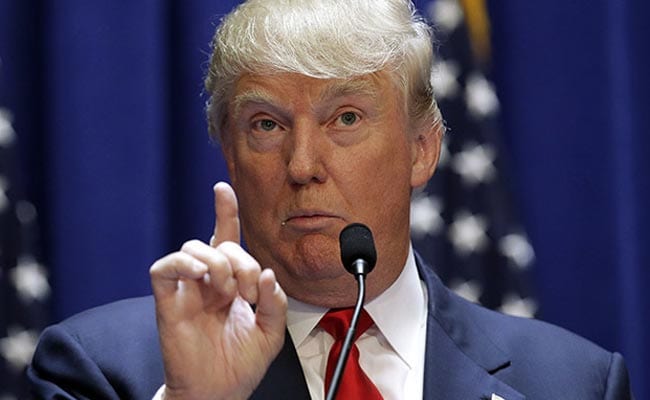
Donald Trump's decision to pull out of the debate over a feud with host Fox News was a gamble, particularly so close to the state of voting.
Des Moines, Iowa:
Front-runner Donald Trump's boycott of the final Republican debate before the Iowa caucuses created space for his rivals to delve more deeply into their differences on immigration, foreign policy and their approach to governing.
Iowa voters kick off the 2016 nominating process with Monday's caucuses, and they'll provide the first indication of whether Trump's abrupt decision to skip the debate will have any impact on his standing atop the party's field.
His lead in Iowa had become more tenuous in recent days, as Texas Senator Ted Cruz pulled in support from conservative and evangelical voters.
Trump's decision to pull out of the debate over a feud with host Fox News was a gamble, particularly so close to the state of voting. He tried to steal attention away from his rivals with a competing rally that he said raised $6 million for military veterans.
Trump's absence put the spotlight on Cruz and Florida Senator Marco Rubio, who needs a strong showing in Iowa in order to stay in the top tier of candidates.
The two senators were confronted with video clips suggesting they had changed their positions on immigration, one of the most contentious issues among Republicans.
Both denied they had switched their own views on allowing some people in the US illegally to stay.
Cruz accused Rubio of making a "politically advantageous" decision to support a 2013 Senate bill that included a pathway to citizenship, while Rubio said his Texas rival was "willing to say or do anything to get votes."
The candidates worked hard to present themselves as best prepared to be commander in chief and take on terror threats.
Rubio pledged that as president he would go after terrorists "wherever they are. And if we capture them alive, they are going to Guantanamo." Rubio also stood by his previous calls for shutting down mosques in the US if there were indications they were being used to radicalize terrorists.
Kentucky Senator Rand Paul warned against closing down mosques. A proponent of a more isolationist foreign policy, Paul also raised concerns about the US getting involved militarily in Syria, where the Islamic State group has a stronghold.
The crowded Republican field includes more mainstream candidates who have struggled to break through in an election year where Trump, and increasingly Cruz, have tapped into voter anger with the political system. Party leaders have grown increasingly anxious for some of the more traditional candidates to step aside to allow one to rise up and challenge for the nomination.
Former Florida Governor Jeb Bush said: "We're just starting out. The first vote hasn't been counted. Why don't we let the process work?"
Bush and New Jersey Governor Chris Christie, along with Ohio Governor John Kasich, are looking beyond Iowa and hoping New Hampshire's February 9 primary jumpstarts their campaigns.
Iowa voters kick off the 2016 nominating process with Monday's caucuses, and they'll provide the first indication of whether Trump's abrupt decision to skip the debate will have any impact on his standing atop the party's field.
His lead in Iowa had become more tenuous in recent days, as Texas Senator Ted Cruz pulled in support from conservative and evangelical voters.
Trump's decision to pull out of the debate over a feud with host Fox News was a gamble, particularly so close to the state of voting. He tried to steal attention away from his rivals with a competing rally that he said raised $6 million for military veterans.
Trump's absence put the spotlight on Cruz and Florida Senator Marco Rubio, who needs a strong showing in Iowa in order to stay in the top tier of candidates.
The two senators were confronted with video clips suggesting they had changed their positions on immigration, one of the most contentious issues among Republicans.
Both denied they had switched their own views on allowing some people in the US illegally to stay.
Cruz accused Rubio of making a "politically advantageous" decision to support a 2013 Senate bill that included a pathway to citizenship, while Rubio said his Texas rival was "willing to say or do anything to get votes."
The candidates worked hard to present themselves as best prepared to be commander in chief and take on terror threats.
Rubio pledged that as president he would go after terrorists "wherever they are. And if we capture them alive, they are going to Guantanamo." Rubio also stood by his previous calls for shutting down mosques in the US if there were indications they were being used to radicalize terrorists.
Kentucky Senator Rand Paul warned against closing down mosques. A proponent of a more isolationist foreign policy, Paul also raised concerns about the US getting involved militarily in Syria, where the Islamic State group has a stronghold.
The crowded Republican field includes more mainstream candidates who have struggled to break through in an election year where Trump, and increasingly Cruz, have tapped into voter anger with the political system. Party leaders have grown increasingly anxious for some of the more traditional candidates to step aside to allow one to rise up and challenge for the nomination.
Former Florida Governor Jeb Bush said: "We're just starting out. The first vote hasn't been counted. Why don't we let the process work?"
Bush and New Jersey Governor Chris Christie, along with Ohio Governor John Kasich, are looking beyond Iowa and hoping New Hampshire's February 9 primary jumpstarts their campaigns.
Track Latest News Live on NDTV.com and get news updates from India and around the world

